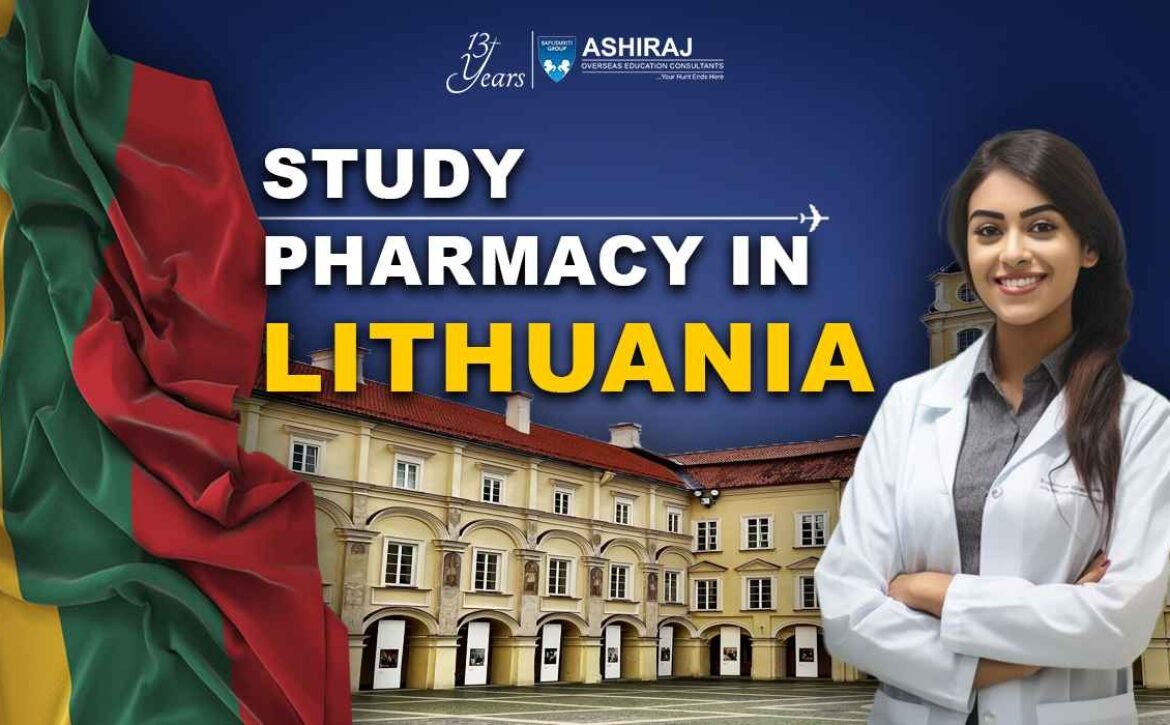
Pharmacy in Lithuania
Pharmacy in Lithuania encompasses a vibrant sector deeply rooted in the nation’s healthcare framework. Lithuania boasts a sophisticated pharmaceutical landscape characterized by a robust network of pharmacies, pharmaceutical manufacturers, and research institutions. With a focus on delivering high-quality healthcare services and products, the pharmacy sector in Lithuania plays a pivotal role in ensuring the well-being of its citizens. From traditional community pharmacies to modernized healthcare facilities, the country offers a diverse range of pharmaceutical services catering to the diverse needs of its populace. Moreover, Lithuania’s pharmacy sector is bolstered by stringent regulatory frameworks and adherence to international standards, ensuring the safety and efficacy of pharmaceutical products distributed within its borders.
Embracing technological advancements and fostering innovation, Pharmacy in Lithuania continually evolves to meet the dynamic demands of modern healthcare. This evolution is evident in the integration of digital solutions, telepharmacy services, and personalized medication management systems. The emphasis on continuous professional development further strengthens the pharmacy workforce, ensuring that practitioners are equipped with the latest knowledge and skills to deliver optimal patient care. As Lithuania continues to prioritize advancements in healthcare infrastructure and services, its pharmacy sector stands as a cornerstone in the nation’s journey towards sustainable health and wellness for all.
Why to Study Pharmacy in Lithuania?
- Internationally Recognized Programs: Pharmacy programs in Lithuania are accredited and recognized worldwide, offering quality education that meets global standards.
- Affordable Tuition Fees: Compared to many Western European countries, studying pharmacy in Lithuania is cost-effective, making it an attractive option for international students.
- Multicultural Environment: Lithuania’s universities attract students from diverse cultural backgrounds, providing opportunities for cross-cultural interactions and learning experiences.
- Modern Facilities: Pharmacy schools in Lithuania are equipped with state-of-the-art facilities, including laboratories and research centers, fostering practical learning and innovation.
- Clinical Experience: Students gain valuable clinical experience through internships and placements in Lithuania’s healthcare institutions, preparing them for real-world pharmacy practice.
- English-Taught Programs: Many pharmacy programs in Lithuania are offered in English, eliminating language barriers and welcoming international students.
- Research Opportunities: Lithuania encourages research and innovation in pharmacy, offering students opportunities to engage in cutting-edge research projects alongside experienced faculty.
- EU Membership Benefits: As a member of the European Union, studying pharmacy in Lithuania provides access to various EU programs and opportunities for professional development.
- Quality of Life: Lithuania offers a high quality of life with affordable living costs, making it an ideal destination for students pursuing pharmacy education.
Top Universities to Study Pharmacy in Lithuania
University | QS World University Rankings 2023 | Type of University | Average Annual Fees | Programs Offered |
Vilnius University | 801-1000 | Public | €1,000 – €5,000 | Bachelor’s, Master’s, and PhD in Pharmacy |
Kaunas University of Health Sciences | 1001-1200 | Public | €1,000 – €5,000 | Bachelor’s, Master’s, and PhD in Pharmacy |
Lithuanian University of Health Sciences | – | Public | €1,000 – €5,000 | Bachelor’s, Master’s, and PhD in Pharmacy |
Klaipeda University | – | Public | €1,000 – €5,000 | Bachelor’s and Master’s in Pharmacy |
Vytautas Magnus University | – | Public | €1,000 – €5,000 | Bachelor’s and Master’s in Pharmacy |
- Vilnius University: A renowned public institution offering a wide range of pharmacy programs at undergraduate, postgraduate, and doctoral levels with moderate annual fees.
- Kaunas University of Health Sciences: Known for its strong emphasis on healthcare education, this university offers comprehensive pharmacy programs at affordable rates.
- Lithuanian University of Health Sciences: Another leading public university providing pharmacy education at various levels, maintaining a balance between quality and affordability.
- Klaipeda University: Offers bachelor’s and master’s programs in pharmacy, providing students with essential knowledge and skills in pharmaceutical sciences.
- Vytautas Magnus University: Provides pharmacy education with a focus on research and innovation, contributing to the advancement of the field in Lithuania.
Course Curriculum for Pharmacy in Lithuania
- Foundational Sciences: The curriculum typically starts with courses in basic sciences such as chemistry, biology, and physiology, laying a strong foundation for pharmaceutical studies.
- Pharmaceutical Chemistry: Students delve into the study of drug composition, synthesis, and analysis, understanding the chemical properties of pharmaceutical compounds.
- Pharmacology: Focuses on the effects of drugs on the body, covering topics like drug mechanisms, interactions, and pharmacokinetics to ensure safe and effective medication use.
- Pharmacy Practice: Includes courses on pharmaceutical care, patient counseling, and medication management, preparing students for hands-on practice in community and clinical settings.
- Clinical Pharmacy: Provides insights into patient-centered care, medication therapy management, and pharmaceutical interventions, emphasizing the role of pharmacists in healthcare teams.
- Pharmaceutical Technology: Covers drug formulation, manufacturing processes, and quality control methods, equipping students with skills in pharmaceutical production and regulation.
- Research and Capstone Projects: Students engage in research projects, seminars, and practical training to apply theoretical knowledge and contribute to advancements in the field.
- Elective Courses: Offer flexibility for students to explore specialized areas such as pharmacogenomics, toxicology, or pharmaceutical marketing, aligning with their career interests and goals.
Pharmacy in Lithuania offers a comprehensive curriculum that blends scientific principles, clinical practice, and research opportunities, preparing students for diverse roles in the pharmaceutical industry and healthcare sector.
Eligibility Criteria & Admission Requirements for MS in Pharmacy in Lithuania
- Language Proficiency: Applicants must demonstrate proficiency in English by providing either IELTS or TOEFL scores. The minimum required scores for IELTS are 6.5 overall with no band below 6.0, and for TOEFL, a minimum of 80 (iBT) is typically required.
- Standardized Tests: Depending on the university’s requirements, students may need to submit scores for either GRE or GMAT. The average scores accepted may vary between institutions, but a competitive score is generally expected.
- Educational Qualifications: Applicants should hold a relevant undergraduate degree in pharmacy or a related field from a recognized institution. Transcripts showcasing academic performance may also be required.
- Passport & Student Visa: International students must possess a valid passport and obtain a student visa to study in Lithuania. This involves fulfilling visa application requirements and providing the necessary documentation.
- Academic Certificates: Along with transcripts, applicants need to submit copies of academic certificates or diplomas to verify their educational background.
- Work Experience: While not always mandatory, some universities may prefer applicants with relevant work experience in the pharmaceutical field. Previous internships or employment in pharmacies or healthcare settings can strengthen an applicant’s profile.
Test | Minimum Score |
IELTS | 6.5 overall, no band below 6.0 |
TOEFL | 80 (iBT) |
GRE | Varies (Check university requirements) |
GMAT | Varies (Check university requirements) |
Meeting these eligibility criteria ensures that prospective students are academically prepared and linguistically equipped to pursue pharmacy education in Lithuania, contributing to their success in the program and future career endeavors.
Documents Required for Studying Pharmacy in Lithuania
- Passport: A valid passport is essential for international students applying to pharmacy programs in Lithuania, serving as identification and proof of nationality.
- Letters of Recommendation (LOR): Typically, applicants need to submit two or more LORs from academic or professional referees who can attest to their character, academic abilities, and suitability for pharmacy studies.
- Statement of Purpose (SOP): An SOP outlines the applicant’s academic and professional background, career goals, reasons for choosing pharmacy in Lithuania, and how the program aligns with their aspirations.
- Curriculum Vitae (CV): A detailed CV provides an overview of the applicant’s educational qualifications, work experience, research projects, publications, and extracurricular activities relevant to pharmacy.
- Official High School Transcripts and Certificates: Transcripts and certificates from high school or equivalent institutions demonstrate the applicant’s academic performance and completion of prerequisite coursework.
- Work Experience Certificate: If applicable, a certificate verifying any relevant work experience in the pharmaceutical or healthcare field strengthens the applicant’s profile.
- Proof of Financial Resources: International students must demonstrate sufficient financial resources to cover tuition fees, living expenses, and other costs associated with studying pharmacy in Lithuania.
Ensuring the timely submission of these documents facilitates the application process and enhances the chances of securing admission to a pharmacy program in Lithuania.
Admission Process for Pharmacy in Lithuania
- Research Universities: Explore reputable universities in Lithuania offering pharmacy programs, considering factors like accreditation, faculty expertise, and program curriculum.
- Review Eligibility Criteria: Check the admission requirements for each university, including academic qualifications, language proficiency tests (IELTS/TOEFL), and standardized test scores (GRE/GMAT).
- Prepare Required Documents: Gather essential documents such as passport, academic transcripts, letters of recommendation (LOR), statement of purpose (SOP), curriculum vitae (CV), and proof of financial resources.
- Submit Online Application: Complete the university’s online application form accurately, providing personal details, and educational background, and uploading required documents as per instructions.
- Pay Application Fee: Pay the application fee as specified by the university, usually through online payment methods, to process the application.
- Wait for Evaluation: After applying, wait for the university to evaluate your credentials and determine your eligibility for admission.
- Interview (If Required): Some universities may conduct interviews to assess applicants’ suitability for the pharmacy program. Prepare well and present yourself confidently during the interview.
- Receive Admission Decision: Upon evaluation, the university will notify you of the admission decision, either through email or the online application portal.
- Accept Offer and Obtain Visa: If accepted, follow the university’s instructions to accept the offer of admission and proceed with obtaining a student visa for studying pharmacy in Lithuania.
- Plan for Arrival: Once the visa is approved, make necessary arrangements for travel, accommodation, and other logistics to begin your pharmacy studies in Lithuania.
Following these steps meticulously ensures a smooth admission process and sets you on the path to pursuing pharmacy education in Lithuania.
“Education is the most powerful weapon which you can use to change the world.”
Nelson Mandela
Cost of Pharmacy Course in Lithuania
- Tuition Fees: The cost of tuition for pharmacy programs in Lithuania varies depending on the university and whether the student is an EU or non-EU citizen. On average, tuition fees range from €1,000 to €5,000 per year.
- Living Expenses: Students should budget for living expenses, including accommodation, food, transportation, and personal expenses. The cost of living in Lithuania is relatively affordable compared to many Western European countries.
- Accommodation: Housing options include university dormitories, private apartments, or shared accommodations. Rent prices vary depending on the location and type of accommodation, with options available to suit different budgets.
- Health Insurance: International students are required to have health insurance coverage during their stay in Lithuania. This may be provided by the university or purchased independently, adding to the overall cost of studying.
- Books and Supplies: Students should budget for textbooks, study materials, and laboratory supplies required for pharmacy courses. Second-hand books and online resources may help reduce costs.
- Extracurricular Activities: Participating in extracurricular activities or joining student organizations may incur additional expenses, but they offer valuable opportunities for personal and professional development.
Understanding the cost of studying pharmacy in Lithuania helps prospective students plan their finances and make informed decisions about pursuing education in this field.
Scholarships for Pharmacy Courses in Lithuania
Scholarship Name | Amount | Application Deadline |
Vilnius University | €1,000 – €5,000 per year | May 31st |
Lithuanian Government Scholarship | Full tuition fee waiver + Monthly stipend | April 1st |
Santara Scholarship | Up to €6,000 per year | June 15th |
Kazickas Family Foundation Scholarship | Varies | February 15th |
Erasmus+ Scholarships | Varies | Varies |
Scholarships for Pharmacy in Lithuania offer financial assistance to international students pursuing pharmacy education in the country. These scholarships cover various expenses such as tuition fees, living costs, and research expenses, making studying pharmacy in Lithuania more accessible and affordable. The application deadlines vary depending on the scholarship program, so applicants should carefully review the requirements and submit their applications accordingly to maximize their chances of receiving financial support. Additionally, scholarships like the Lithuanian Government Scholarship provide full tuition fee waivers along with monthly stipends, offering significant support to deserving students pursuing pharmacy studies in Lithuania.
Career Opportunities After Pharmacy in Lithuania
Job Profile | Average Salary (EUR) |
Pharmacist | 20,000 – 35,000 |
Clinical Pharmacist | 25,000 – 40,000 |
Hospital Pharmacist | 22,000 – 38,000 |
Pharmaceutical Researcher | 28,000 – 45,000 |
Regulatory Affairs Specialist | 30,000 – 50,000 |
Career opportunities after studying pharmacy in Lithuania offer lucrative prospects for graduates in various sectors. Pharmacists play a vital role in healthcare settings, dispensing medications, providing patient care, and counseling on medication usage. Clinical pharmacists work closely with healthcare teams to optimize medication therapy and ensure patient safety. Hospital pharmacists manage medication distribution within hospital settings, ensuring timely access to medications for patients. Pharmaceutical researchers contribute to drug discovery, development, and testing, driving innovation in the pharmaceutical industry. Regulatory affairs specialists ensure compliance with pharmaceutical regulations and standards, facilitating the approval and marketing of pharmaceutical products. With competitive salaries ranging from 20,000 to 50,000 EUR annually, pharmacy graduates in Lithuania can pursue fulfilling careers with opportunities for growth and advancement in the pharmaceutical sector.
Frequently Asked Questions About Pharmacy in Lithuania
Most universities in Lithuania offering pharmacy programs require international students to demonstrate proficiency in English through tests like IELTS or TOEFL.
Yes, several scholarships are available, including those offered by universities, the Lithuanian government, private foundations, and EU programs like Erasmus+.
Typically, a pharmacy degree in Lithuania takes 5 to 6 years to complete, including both undergraduate and master’s level studies.
Yes, international pharmacy graduates can work in Lithuania, but they may need to meet certain licensing or registration requirements set by the Lithuanian Pharmacy Association.
Pharmacy graduates in Lithuania have diverse career opportunities in sectors such as community pharmacies, hospitals, the pharmaceutical industry, research institutions, and regulatory agencies.
While work experience is not always mandatory, having relevant experience in the pharmaceutical or healthcare field can enhance an applicant’s profile during the admission process.
The cost of studying pharmacy in Lithuania varies depending on the university, program, and whether the student is an EU or non-EU citizen. On average, tuition fees range from €1,000 to €5,000 per year.
The application process typically involves submitting an online application form, providing required documents such as transcripts, letters of recommendation, and proof of language proficiency, and paying the application fee.
Yes, international students with a valid student visa are allowed to work part-time in Lithuania, usually up to 20 hours per week during the academic year and full-time during holidays.
Yes, many pharmacy programs in Lithuania are offered in English, making them accessible to international students.




